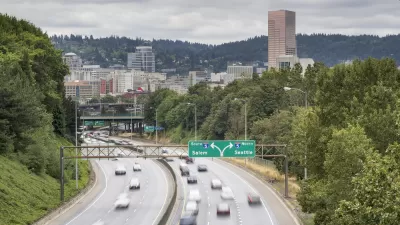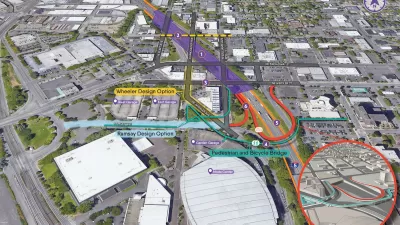The end of an Oregon freeway project didn't get much fanfare, but the victory is worth celebrating.

In a piece in Streetsblog USA originally published on City Observatory, Joe Cortright describes the hard-won battle of Portland, Oregon’s anti-freeway advocates as the Oregon Department of Transportation (ODOT) unceremoniously “deleted” a proposed widening project on Interstate 205 due to “revenue uncertainty.”
As Cortright notes, “This is how bad projects die: Agencies finally, and reluctantly, concede that they don’t have the money to pay for them, and that they are so bad that no one can be convinced to appropriate (or borrow) the money needed to move them forward.” The battle to stop freeway expansions is often a slog, and the final win, if and when it comes, often amounts to a “bureaucratic footnote.”
Cortright hopes this was just a “first small victory” for freeway fighters in Oregon. “Oregon DOT continues to maintain the ‘extend and pretend’ fiction that its now-$1.9 billion Rose Quarter project is still alive, but it too, will have to yield to the fiscal reality that the highway department is essentially broke and doesn’t have the resources to maintain the roads it currently has, much less build enormously expensive new ones.”
FULL STORY: This is What Victory Looks like, Freeway Fighters

Maui's Vacation Rental Debate Turns Ugly
Verbal attacks, misinformation campaigns and fistfights plague a high-stakes debate to convert thousands of vacation rentals into long-term housing.

Planetizen Federal Action Tracker
A weekly monitor of how Trump’s orders and actions are impacting planners and planning in America.

In Urban Planning, AI Prompting Could be the New Design Thinking
Creativity has long been key to great urban design. What if we see AI as our new creative partner?

King County Supportive Housing Program Offers Hope for Unhoused Residents
The county is taking a ‘Housing First’ approach that prioritizes getting people into housing, then offering wraparound supportive services.

Researchers Use AI to Get Clearer Picture of US Housing
Analysts are using artificial intelligence to supercharge their research by allowing them to comb through data faster. Though these AI tools can be error prone, they save time and housing researchers are optimistic about the future.

Making Shared Micromobility More Inclusive
Cities and shared mobility system operators can do more to include people with disabilities in planning and operations, per a new report.
Urban Design for Planners 1: Software Tools
This six-course series explores essential urban design concepts using open source software and equips planners with the tools they need to participate fully in the urban design process.
Planning for Universal Design
Learn the tools for implementing Universal Design in planning regulations.
planning NEXT
Appalachian Highlands Housing Partners
Mpact (founded as Rail~Volution)
City of Camden Redevelopment Agency
City of Astoria
City of Portland
City of Laramie





























